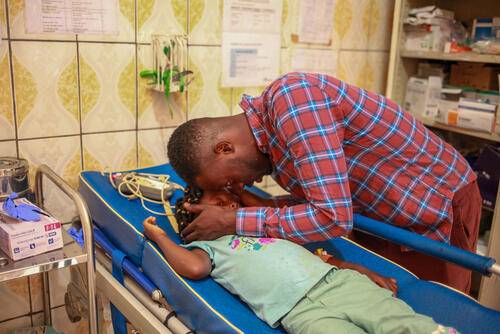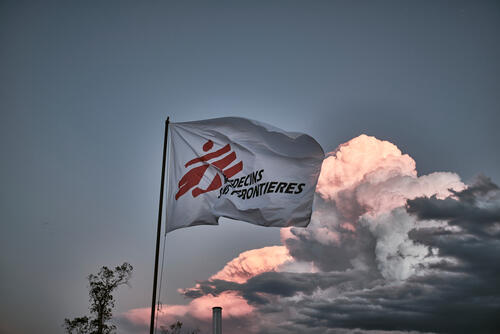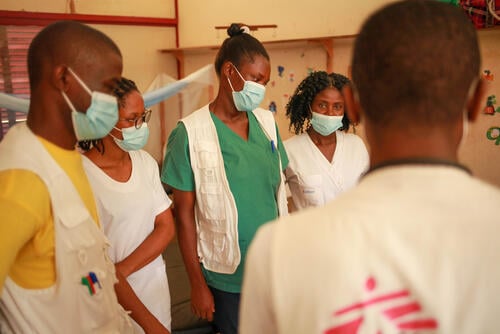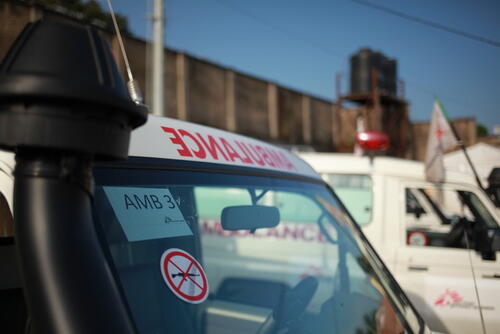- As violence continues in the anglophone North-West and South West regions of Cameroon, people have struggled to access healthcare.
- The situation has been exacerbated over the last nearly seven months, as Cameroonian authorities suspended MSF’s services in the North-West region.
- MSF calls on the Cameroon government to prioritise people's healthcare needs and lift the suspension on MSF, allowing us to resume our lifesaving medical activities.
Yaoundé – While thousands of people struggle to access vital healthcare in the restive North-West region of Cameroon, Médecins Sans Frontières (MSF) has been denied the resumption of our healthcare services in the region, six months after a forced suspension by Cameroonian authorities. MSF calls on the government of Cameroon to immediately lift this suspension and prioritise the medical needs of people.
For over four years now, extreme violence in Cameroon’s anglophone regions of North-West and South-West has led to a catastrophic situation for people. Raids on villages, kidnappings, torture, destruction of properties, and extrajudicial killings have become the new normal in what is commonly known as the “anglophone crisis”.
In 2018, in agreement with Cameroon’s Ministry of Health, MSF launched an emergency response to the critical healthcare situation in the North-West and South-West regions, by supporting health facilities. We set up the only free 24/7 ambulance services, and supported community health volunteers in order to reach remote people and those struggling to access healthcare facilities.
But on 8 December 2020, we were suspended from working in the North-West regionRegional Decision 966 RD/E/GNWR.22/IGRS suspending the partnership between Doctors Without Borders and St Maria Soledad as well as related partnerships with other health facilities in the North-West Region pending definition of a framework of activities for Doctors Without Borders by the Minister of Public Health (MINISANTE), as Cameroonian authorities accused us of being too close to non-state armed groups in the area. Despite months of discussions to respond to these allegations, we have been unable to restart our operations, leaving tens of thousands of people without access to lifesaving free healthcare.
As we speak, our community health workers see people die and suffer because of the lack of treatment available in villages and displaced communitiesEmmanuel Lampaert, MSF Operations Coordinator for Central Africa
“Vital medical services have been denied for six months now, and this is taking an unacceptable toll on Cameroonians, many of whom have fled to the bush, unable to bear the sights, sounds and threats of violence any longer,” says Emmanuel Lampaert, MSF Operations Coordinator for Central Africa. “This decision represents a substantial blow to medical and humanitarian access.”
“As we speak, our community health workers see people die and suffer because of the lack of treatment available in villages and displaced communities, and our ambulance call centre continues to receive emergency requests, which they are forced to decline,” says Lampaert. “What rationale can justify these unnecessary deaths?”
“We call on the government of Cameroon to put the needs of people first, and to immediately reinstate MSF’s essential medical services in the North-West,” continues Lampaert. “Our operations cannot remain on hold indefinitely.”
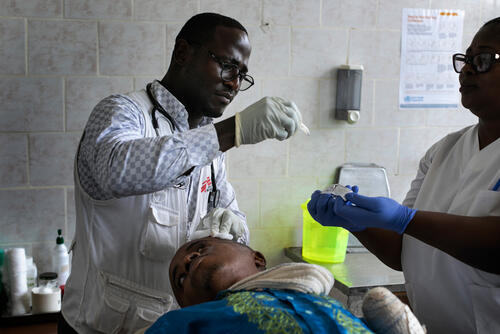
A massive health crisis
While armed violence and violations of human rights have made the headlines in the past years, the impact of this crisis on people’s basic medical needs has often been overlooked in the international media. However, according to the latest UN figures, the flare up of violence in the anglophone regions of Cameroon has pushed more than 700,000 people to flee their homes, while over 60,000 have fled to neighbouring Nigeria. Today, people’s living conditions are massively affected by the crisis, and over 1.4 million people are considered in need of humanitarian support in North-West and South-West Cameroon.
“Access to healthcare services is of major concern in the North-West and South-West regions”, says Lampaert. “Because of insecurity, lockdowns, curfews and the targeting of health facilities, access to healthcare is extremely limited, with at least one in five facilities non-functioning.”
“Displaced people barely dare to move to health facilities, and the economic downturn has made it still harder to travel to hospital, or even to afford treatment,” continues Lampaert. “Unsurprisingly, mortality among vulnerable groups such as women and children has increasedAccording to the United Nations’ <a href="https://reliefweb.int/sites/reliefweb.int/files/resources/Cameroon%20Humanitarian%20Needs%20Overview%202021%20%28issued%20Mar%202021%29.pdf">Humanitarian Needs Overview</a>, March 2021 , and the suspension of our medical support has made the situation even worse.”
While our teams have treated patients for rape, torture, burns and gunshots, the vast majority of patients have been those in need of medical assistance for childbirth, malaria or diarrhoea, especially in displaced communities. Last year, MSF-supported community health workers conducted over 150,000 consultations for communities in both regions.
Vital medical services have been denied for six months now, and this is taking an unacceptable toll on Cameroonians... This decision represents a substantial blow to medical and humanitarian access.Emmanuel Lampaert, MSF Operations Coordinator for Central Africa
Insecurity and restriction of humanitarian space
The support provided by MSF and other humanitarian organisations proved to be all the more vital, as insecurity and attacks on staff have limited the number of organisations present on the ground to provide lifesaving services.
“We are one of the few medical organisations present in those two regions to respond to people’s emergency medical needs, in a very challenging context,” says Lampaert. “Since we started our activities, our medical staff, volunteers and patients have regularly faced threats and violence from both state and non-state armed groups, with very little respect shown for the humanitarian principles of impartiality and neutrality.”
“Our ambulances have been fired on and stolen, community health workers have faced sexual assault and murder, armed men have opened fire inside medical facilities, and our colleagues have faced death threats,” says Lampaert. “Despite these extremely difficult situations, our staff kept on providing care to people in need, day after day.”
In 2020, MSF teams in the North-West region treated 180 survivors of sexual violence, provided 1,725 mental health consultations, performed 3,272 surgeries, and referred 4,407 patients by ambulance, of whom more than 1,000 were women in labour. Community health volunteers provided 42,578 consultations, mostly for malaria, diarrhoea and respiratory tract infections.
Present in many countries where government forces and non-state armed groups clash, MSF is committed to our charter which requires the provision of healthcare without discrimination or heed to political or religious affiliations, race or gender.
MSF has been working in Cameroon since 1984. Today we run medical humanitarian projects in the far north, and in the South-West regions of the country. In the far north we have been present since 2012, with services such as surgical care, maternal and obstetric care and medical care, and psychological care. We have been working in the North-West and South-West since 2018 to provide maternity and obstetric care; surgical care; treatment for diseases like malaria, cholera and COVID-19; and an ambulance service available seven days a week, 24 hours a day to get people to hospital during emergencies. In December, 2020, our activities in the North-West were suspended by the Cameroonian authorities. We work in each of these regions based on our assessment of people’s need. All the care provided by MSF is free of charge and carried out in accordance with medical ethics.



